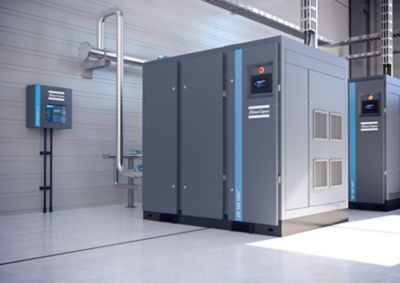The Impact of Air Compressors on Fertilizer Quality
November 13, 2024
In agriculture, fertilizers are essential to replenish the nutrients that crops extract from the soil. By providing vital elements such as nitrogen, phosphorus, and potassium, fertilizers ensure that plants grow strong and healthy. Without them crop yields would plummet, significantly impacting agricultural productivity and food security.
Agriculture is the backbone of our society, providing us with food, fiber, and raw materials for various industries. One key aspect of modern agriculture is the use of fertilizers to enhance crop yields and maintain soil fertility. What many may not know is that air compressors play an essential role in the fertilizer industry.
Air Compressors and Fertilizer Production
Fertilizers are essential for supplying plants with the necessary nutrients to thrive. In the fertilizer manufacturing process, air compressors are used in various critical applications:
- Ammonia Production: Ammonia, a primary component of nitrogen-based fertilizers, is produced through the Haber-Bosch process. This process relies on high-pressure air compressors to synthesize ammonia from nitrogen and hydrogen.
- Nitric Acid Production: Nitric acid is another key ingredient in fertilizers. Air compressors are essential for producing nitric acid through the Ostwald process, which oxidizes ammonia using compressed air to produce nitric acid, another vital fertilizer component.
- Ammonium Nitrate Production: Compressed air is used for prilling or granulating ammonium nitrate, making it easier to handle and distribute as a fertilizer.
- Mixing and Blending: Air compressors are employed to power mixers and blenders that combine various raw materials to create specific fertilizer formulations. Precise blending ensures that the final product contains the ideal nutrient balance for optimal plant growth.
Beyond manufacturing, air compressors are equally important in the packaging and storage of fertilizers. They are used to create airtight seals in packaging to prevent moisture absorption, ensuring the longevity and effectiveness of the fertilizers. Furthermore, during storage, controlled air compression systems help maintain the proper environmental conditions, preventing the degradation of sensitive compounds within the fertilizers.
Air Compressors in Fertilizer Distribution
Fertilizer distribution is another critical aspect of the industry, where air compressors offer their services:
- Bulk Material Handling: Air compressors are used in conveying systems that transport fertilizers from manufacturing facilities to distribution centers and farms. They efficiently move large quantities of granulated or powdered fertilizer over long distances.
- Pneumatic Spreading: On the farm, air compressors power pneumatic spreaders that evenly distribute fertilizers across fields. This method minimizes waste and ensures uniform nutrient application.
The role of air compressors extends beyond just manufacturing; they are integral to the logistics involved in delivering fertilizers to end-users. By operating the pneumatic systems of transportation vehicles, air compressors ensure that fertilizers are transported efficiently and without contamination. This seamless integration in both production and distribution highlights their significance in sustaining the agricultural supply chain, ultimately securing global food production.
The fertilizer industry, though often overlooked, is vital for maintaining food security, and air compressors play a crucial role in ensuring the efficient production, mixing, blending, and distribution of fertilizers, thereby supporting agricultural sustainability.

